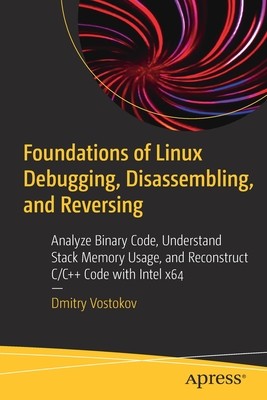
- We will send in 10–14 business days.
- Author: Dmitry Vostokov
- Publisher: Apress
- ISBN-10: 1484291522
- ISBN-13: 9781484291528
- Format: 15.6 x 23.4 x 1 cm, minkšti viršeliai
- Language: English
- SAVE -10% with code: EXTRA
Foundations of Linux Debugging, Disassembling, and Reversing (e-book) (used book) | bookbook.eu
Reviews
Description
Review topics ranging from Intel x64 assembly language instructions and writing programs in assembly language, to pointers, live debugging, and static binary analysis of compiled C and C++ code. This book is ideal for Linux desktop and cloud developers.
Using the latest version of Debian, you'll focus on the foundations of the diagnostics of core memory dumps, live and postmortem debugging of Linux applications, services, and systems, memory forensics, malware, and vulnerability analysis. This requires an understanding of x64 Intel assembly language and how C and C++ compilers generate code, including memory layout and pointers.
This book provides the back-ground knowledge and practical foundations you'll need in order to master internal Linux program structure and behavior. It consists of practical step-by-step exercises of increasing complexity with explanations and ample diagrams. You'll also work with the GDB debugger and use it for disassembly and reversing.
By the end of the book, you will have a solid understanding of how Linux C and C++ compilers generate binary code. In addition, you will be able to analyze such code confidently, understand stack memory usage, and reconstruct original C/C++ code. Foundations of Linux Debugging, Disassembling, and Reversing is the perfect companion to Foundations of ARM64 Linux Debugging, Disassembling, and Reversing for readers interested in the cloud or cybersecurity.
What You'll Learn
- Review the basics of x64 assembly language
- Examine the essential GDB debugger commands for debugging and binary analysis
- Study C and C++ compiler code generation with and without compiler optimizations
- Look at binary code disassembly and reversing patterns
- See how pointers in C and C++ are implemented and used
Software support and escalation engineers, cloud security engineers, site reliability engineers, DevSecOps, platform engineers, software testers, Linux C/C++ software engineers and security researchers without Intel x64 assembly language background, beginners learning Linux software reverse engineering techniques, and engineers coming from non-Linux environments.
EXTRA 10 % discount with code: EXTRA
The promotion ends in 23d.14:23:14
The discount code is valid when purchasing from 10 €. Discounts do not stack.
- Author: Dmitry Vostokov
- Publisher: Apress
- ISBN-10: 1484291522
- ISBN-13: 9781484291528
- Format: 15.6 x 23.4 x 1 cm, minkšti viršeliai
- Language: English English
Review topics ranging from Intel x64 assembly language instructions and writing programs in assembly language, to pointers, live debugging, and static binary analysis of compiled C and C++ code. This book is ideal for Linux desktop and cloud developers.
Using the latest version of Debian, you'll focus on the foundations of the diagnostics of core memory dumps, live and postmortem debugging of Linux applications, services, and systems, memory forensics, malware, and vulnerability analysis. This requires an understanding of x64 Intel assembly language and how C and C++ compilers generate code, including memory layout and pointers.
This book provides the back-ground knowledge and practical foundations you'll need in order to master internal Linux program structure and behavior. It consists of practical step-by-step exercises of increasing complexity with explanations and ample diagrams. You'll also work with the GDB debugger and use it for disassembly and reversing.
By the end of the book, you will have a solid understanding of how Linux C and C++ compilers generate binary code. In addition, you will be able to analyze such code confidently, understand stack memory usage, and reconstruct original C/C++ code. Foundations of Linux Debugging, Disassembling, and Reversing is the perfect companion to Foundations of ARM64 Linux Debugging, Disassembling, and Reversing for readers interested in the cloud or cybersecurity.
What You'll Learn
- Review the basics of x64 assembly language
- Examine the essential GDB debugger commands for debugging and binary analysis
- Study C and C++ compiler code generation with and without compiler optimizations
- Look at binary code disassembly and reversing patterns
- See how pointers in C and C++ are implemented and used
Software support and escalation engineers, cloud security engineers, site reliability engineers, DevSecOps, platform engineers, software testers, Linux C/C++ software engineers and security researchers without Intel x64 assembly language background, beginners learning Linux software reverse engineering techniques, and engineers coming from non-Linux environments.


Reviews